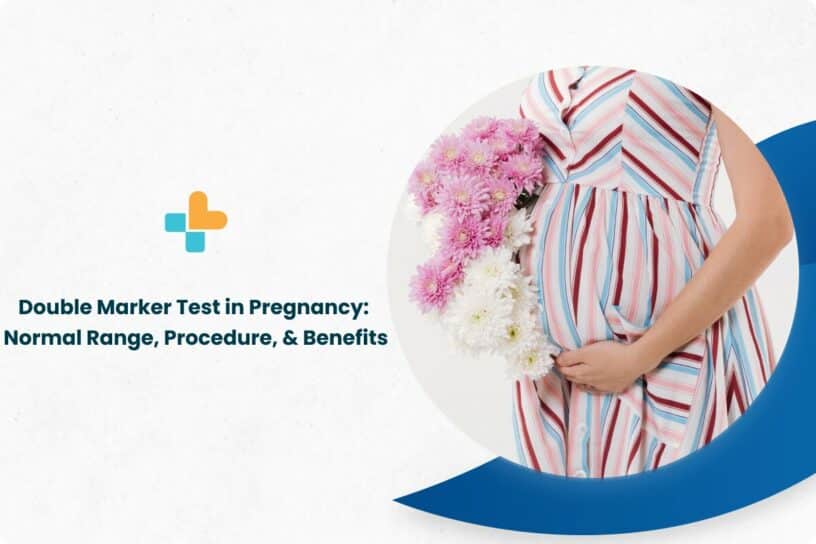Pregnancy is a beautiful phase in a mother’s life. With all the advances in the field of medicine, science, and technology, it has become easier to view the entire journey of the baby. There are various tests that are carried out during pregnancy to check the growth of the baby and check for any signs of abnormality that might be present in the baby. One such test that is performed during pregnancy is a double marker test.
In this blog, we will learn more about the double marker pregnancy test. So please keep reading.
What Is a Double Marker Test in Pregnancy?
A double marker test is a common test that is prescribed to a pregnant woman and is to be conducted in the first trimester of the pregnancy. This test is otherwise also known as maternal serum screening. A double marker test is a predictive test and not a definitive one. In essence, this test only shows the likelihood of any chromosomal abnormalities. A double marker test checks and measures the levels of both free beta human chorionic gonadotropin (beta-hCG) and pregnancy associated plasma protein A (PAPP-A).
A double marker test is a common test that is prescribed to a pregnant woman and is to be conducted in the first trimester of the pregnancy. This test is otherwise also known as maternal serum screening. A double marker test is a predictive test and not a definitive one. In essence, this test only shows the likelihood of any chromosomal abnormalities. A double marker test checks and measures the levels of both free beta human chorionic gonadotropin (beta-hCG) and pregnancy associated plasma protein A (PAPP-A).
A double marker test is usually done in the first trimester to screen for any chromosomal abnormality in the baby. This test is not mandatory and is usually recommended to be done in women who are aged above 35 years or who are at high risk due to any family history or have any other condition. Before undergoing a double marker test, it is important to ascertain the effect the results will have on you. Will it affect your mental health? Will be you be willing to undergo further invasive testing? Or will the results change the way you were to manage the pregnancy?
Since the answers to these doubts are totally dependent on the medical history and the mother’s personal choice, there are no definitive answers to them.
During the procedure for a double marker test screening, an ultrasound examination will be conducted first, followed by a blood test to measure the levels of free beta-hCG and PAPP-A.
The benefits of double marker test screening are,
- It helps in screening the likelihood of chromosomal abnormalities in the unborn baby.
- It helps the doctor in assessing if there is any risk of mental disorder in the fetus.
- It is a primary test for detecting Down syndrome.
Although there are no risks that are associated with a double marker screening test, it is best to contact your healthcare provider regarding any concerns or queries you may have.
Since a double marker test is like any other simple blood test, there is no need for any special preparations to be done. Before a double marker test, it is safe for the patient to eat normally, unless they are advised by the doctor to follow certain instructions.
Once the test double marker test is done, you are likely to get the results in around 3-7 days
Usually, during pregnancy, the female and male fetuses will have 22 chromosomes. Where a female fetus will have 22 pairs of the XX chromosomes, 22 pairs of the XY chromosomes will be found in male fetuses. Trisomy is a chromosomal abnormality where there is an extra pair of chromosomes in the fetus. This extra pair may lead to abnormalities like:
- Edward’s syndrome: This chromosomal abnormality occurs due to the presence of an extra chromosome 18 copy.
- Down syndrome: This chromosomal abnormality occurs due to the presence of an extra chromosome 21 copy.
- Patau’s syndrome: This chromosomal abnormality occurs due to the presence of an extra chromosome 13 copy.
It has been found that in a pregnant woman having a chromosomal abnormality, the hCG and PAPP-A levels may be higher or lower than the normal level. A double marker test alone is not enough to produce definitive results. Hence, along with the test, another test called a nuchal translucency (NT) scan would also be conducted. This NT scan helps in examining the clear tissue found behind the baby’s neck.
Why Is a Double Marker Test Done?
A double marker test is usually done in the first trimester to screen for any chromosomal abnormality in the baby. This test is not mandatory and is usually recommended to be done in women who are aged above 35 years or who are at high risk due to any family history or have any other condition. Before undergoing a double marker test, it is important to ascertain the effect the results will have on you. Will it affect your mental health? Will be you be willing to undergo further invasive testing? Or will the results change the way you were to manage the pregnancy?
Since the answers to these doubts are totally dependent on the medical history and the mother’s personal choice, there are no definitive answers to them.
What Is The Procedure For Double Marker Test Screening?
During the procedure for a double marker test screening, an ultrasound examination will be conducted first, followed by a blood test to measure the levels of free beta-hCG and PAPP-A.
What Are The Benefits Of The Procedure?
The benefits of double marker test screening are,
- It helps in screening the likelihood of chromosomal abnormalities in the unborn baby.
- It helps the doctor in assessing if there is any risk of mental disorder in the fetus.
- It is a primary test for detecting Down syndrome.
- This test helps in the detection of trisomy 18, which could cause mental issues and birth defects.
- This test helps in the detection of trisomy 21, which could lead to mental and heart problems in the baby, as well as cause health problems in other important organs.
Time And Cost Of The Double Marker Test
Your doctor will prescribe the double marker test anywhere between 11 to 14 weeks of the pregnancy. The cost of a double marker test is around INR 2500 to INR 3500 and will differ from hospital to hospital.
What Are The Risks That Are Associated With a Double Marker Test Screening?
Although there are no risks that are associated with a double marker screening test, it is best to contact your healthcare provider regarding any concerns or queries you may have.
How Should a Patient Prepare For The Double Marker Test?
Since a double marker test is like any other simple blood test, there is no need for any special preparations to be done. Before a double marker test, it is safe for the patient to eat normally, unless they are advised by the doctor to follow certain instructions.
What To Expect When The Double Marker Test Is Done?
Once the test double marker test is done, you are likely to get the results in around 3-7 days
Standard Results For The Double Marker Test
You are likely to receive one of the following results for the double marker test,
- Low risk
- Moderate risk
- High risk
If the results show low risk or screen negative, then it is considered normal as the chances of chromosomal abnormalities in the baby are less. However, it is essential to note that low-risk result doesn’t always implicate that there may not be any issue with the baby. This is because a double marker test only screens for markers for trisomy 13, trisomy 18, and trisomy 21 and not other possible health conditions.
Abnormal Results For The Double Marker Test
If the results from the double marker test come as moderate risk or high risk, then it means screen positive. To further confirm the results, the doctor may suggest more invasive tests that will produce definitive results. These invasive tests include:
- Noninvasive prenatal testing (NIPT)
- Chorionic villous sampling
- Amniocentesis
Now, although these tests produce definitive results, they may have some risks affecting the pregnancy.
Double Marker Test vs. NT Scan
To get test results with more accuracy, the double marker test and the ultrasound NT scan are done together in the first trimester. These tests, when combined together, can help in detecting chromosomal abnormalities with more accuracy. The NT scan also helps in getting a better image of the baby to view and measure the size of the clear portion present at the back of the neck, as well as check the nasal bone development, which can be a sign of trisomy.
Conclusion
A double marker test that helps in screening chromosomal abnormalities in the unborn baby. This test helps in preparing the parents in case the baby is born with special needs. You can contact your healthcare provider and raise any concerns you may have regarding the baby and the pregnancy.
At Ayu Health, the patients get the best possible healthcare at affordable prices. Having an excellent team of doctors and healthcare professionals, it’s undoubtedly the best option for anybody. Are you looking for good gynecologists to consult? Contact us at 636-610-0800 to know more.
Our Hospital Locations
Gynaecology Surgery Hospitals in Chandigarh | Gynaecology Surgery Hospitals in Bangalore | Gynaecology Surgery Hospitals in Jaipur | Gynaecology Surgery Hospitals in NCR | Gynaecology Surgery Hospitals in Hyderabad
Our Doctors
Gynaecology Surgery Doctors in Chandigarh | Gynaecology Surgery Doctors in Bangalore | Gynaecology Surgery Doctors in Jaipur | Gynaecology Surgery Doctors in NCR | Gynaecology Surgery Doctors in Hyderabad
About the Author

Dr. Nikitha Murthy B.S.
Dr. Nikitha Murthy B.S. is a renowned Gynaecologist currently practicing at Ayu Health, Bangalore.
He is s a Consultant with IVF Access at its Rajajinagar clinic. She has over 6 years of experience. Dr. Nikitha has a post-graduation (MS) in Gynaecology, DNB from the National Board of India, and a Fellowship in Reproductive Medicine. He also has vast experience in Post-Graduation (MS) in Gynaecology and DNB.




